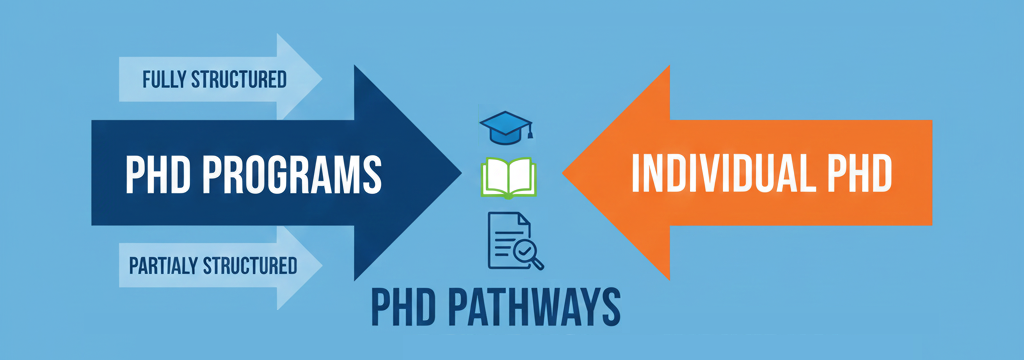
A PhD in law combines a dedication to knowledge advancement with a love of legal studies. A PhD in law is a high-level research degree that focuses on making novel contributions to legal practice, policy, or theory. It prepares graduates for academia, in contrast to a Juris Doctor (JD), which qualifies graduates to practice law. This PhD trip offers an opportunity to delve deeply into complex legal matters, make a positive impact on society, and shape the direction of the law. The road ahead is challenging and rewarding for individuals considering this path. This blog will help you examine each step from comprehending its goal to becoming proficient in the journey.
Can you get a PhD in Law?
Yes, you can get a PhD in Law, and it is considered the highest academic degree in the legal field. Candidates with a PhD in law can focus on cutting-edge legal theory, research, and practice, adding novel insights to fields like legal philosophy, international law, human rights, and constitutional law. The PhD in Law places more emphasis on academic scholarship and research than the Juris Doctor (JD), which is a professional degree aimed at practicing law. For students who wish to work as legal scholars, professors, or policy advisors, this degree is offered by numerous universities across the world. A master’s degree, a compelling research proposal, and academic distinction are frequently prerequisites for admission.
Before Applying to a PhD in Law: Basics
Depending on the country and the program (full-time or part-time), it will typically take 3 to 8 years. Your dissertation, a substantial work of writing that could influence legal discussions, will be written during this time. Pursuing a Law PhD allows you to study specialized areas like human rights, environmental law, or constitutional theory, which can impact significant debates. It is a chance to make a big difference in the legal community. International organizations and universities place a high value on a PhD in law, which enhances both personal growth and employment opportunities. For those interested in teaching or research, this degree can be a stepping stone to prestigious academic positions.

Eligibility, Prerequisites, and Application Process
To enroll in a PhD Law program, you must hold a Master of Laws (LLM) or an equivalent master’s degree. Some universities accept outstanding JD graduates, even though substantial legal knowledge is necessary. Grades and past research experience are taken into account. Being able to communicate in another language is also crucial, especially when studying abroad. Fluency in English, as determined by the IELTS or TOEFL iBT, is usually required for PhD programs, though some might require French or German (in Germany, Switzerland, Austria, France, and Canada). Verify that you meet the requirements for GPA, language skills, and standardized tests by visiting the universities’ websites.
The first step in applying for a PhD in law is locating universities with a law school or department and deadlines. Depending on the semester you are applying for, the deadlines typically fall between November and March, though they are normally rolling basis. For instance, the deadlines are November and December of 202(n) (i.e., 2025 in n=5) if you aim for the fall semester of 202(n+1) (i.e., 2026 in n=5). Required application materials include a resume, research proposal, academic transcripts, and recommendation letters. To show that you are qualified for each program’s PhD courses, tailor and distinguish your application for each program.
Choosing the Right PhD in Law Program
Selecting a PhD program in law requires careful consideration. Your success hinges on the field of expertise of your future PhD supervisor, so look into the faculty members’ research background. Consider the focus of the entire program as well, whether it be interdisciplinary, theoretical, or practical. Location (city and country) and funding sources are also crucial. Securing a PhD in the USA that is fully RA-funded, a PhD in Australia that is fully scholarship-funded, or a PhD position funded by the European Union can lessen the financial burden. Explore university rankings and alumni outcomes to find a program that meets your goals. When choosing a PhD program in law, take into account elements like:
- Research focus: Verify if the university specializes in the field you are interested in.
- Faculty and supervision: Seek for seasoned mentors whose work supports your objectives.
- Opportunities for funding: Look into research grants, assistantships, and scholarships.
- Career outcomes: Take into account the university’s standing in academia and ties to law schools.
- Location and lifestyle: Pick a place that suits both your personal and professional interests.
Obtaining a PhD in law from a university with international recognition improves your credentials and gives you access to a large legal network. There are more financial aid options available through assistantships and scholarships at universities with higher rankings. To maximize your PhD journey, carefully consider universities and institutions that fit your academic and professional goals in law.
What to Expect During a PhD in Law Journey?
Prioritizing self-care is equally important because maintaining mental health is crucial for keeping motivation and focus during this lengthy and demanding journey. To avoid feeling overworked, it is essential to stay organized by setting clear goals and fair deadlines for your writing and research. Attending academic conferences offers advantageous networking opportunities by establishing connections with scholars, legal professionals, and colleagues who can offer new insights and constructive criticism. Ultimately, your perseverance, passion for legal scholarships, and commitment to your well-being will help you get through even the most challenging moments during your PhD program.
Coursework and Research Phases
PhD programs in law in the USA and Canada begin with one to two years of coursework to build skills like legal theory or research methods. Since PhD programs in several European countries, including Germany, Switzerland, Finland, the Netherlands, Belgium, and many more, and Australia are entirely research-based, you will begin your research as soon as possible. The primary components of your doctorate in law are the dissertation and PhD viva. You will spend years writing, researching, and refining your work under the supervision of your main and co-supervisor.
PhD Supervision and PhD Committee
Selecting the right supervisor is one of the most important decisions you will make during your PhD journey. Your primary mentor during the demanding process of obtaining a PhD Law is your research supervisor. They are crucial for directing your research, providing incisive feedback, testing your hypotheses, and ensuring that you stay on the right academic and career path. A strong and supportive supervisor can make a big difference in your research experience by helping you refine your arguments, improve your methods, and navigate the challenges of academic publishing. Therefore, understanding what to anticipate from your PhD supervisor is essential.
In many programs, your supervisor is complemented by a PhD committee composed of multiple faculty members who provide additional guidance and insights. The committee ensures that your research is comprehensive, well-structured, and adheres to academic standards. Their feedback can be very beneficial for refining your dissertation, offering different perspectives, and preparing you for the academic defense.
Defending Your Dissertation
The dissertation defense is the final step in a legal doctoral program. A group of experts will assess the scope and complexity of your work. It’s nerve-racking but exhilarating. Your status as a Doctor of Law is cemented by a successful defense, which comes after years of diligent work. Typically lasting one to three hours, PhD vivas entail a comprehensive analysis of your thesis from start to finish. Depending on the country, the PhD viva may be private or public. In the UK, for instance, it is usually a private exam with an internal and an external examiner. Otherwise, the defense in Germany is typically more formal and stringent, frequently involving a panel of several internal and external referees.

Skills Gained from a PhD in Law
A PhD in law enhances more than just your legal knowledge; it helps you become a more well-rounded professional and scholar. You will develop exceptional critical thinking skills that will allow you to dissect complex legal concepts and transform them into compelling arguments. Naturally, you will be able to conduct both qualitative and quantitative research, which will enable you to assess legal issues from multiple perspectives. Engaging in scholarly discussions, presenting at international conferences, or writing a compelling dissertation will all significantly improve your communication skills. PhD graduates are highly sought after in academia and important fields like government and legal consulting due to their advanced skills.
Challenges Along the Way
Obtaining a doctorate in law is a challenging but rewarding journey that comes with many challenges. Independent research requires perseverance, critical thinking, and the ability to stay motivated without constant supervision. Your resilience may be tested by strict deadlines, multiple revisions, and self-doubt, particularly during the dissertation phase. Balancing academic and personal commitments can be difficult, especially when balancing teaching responsibilities, research publications, or professional engagements. However, overcoming these obstacles enhances your self-control, time management, and problem-solving abilities, i.e., are highly valued in academia and the legal profession, ultimately leading to success and career advancement.
Top Destinations for PhD Programs in Law
Pursuing a PhD in law can be a transformative experience due to its advanced legal knowledge, research opportunities, and academic status. Some of the top PhD positions in law are offered by the USA, UK, Australia, and several European countries. Because each region has its own unique academic traditions, research focus, financial aid sources, and capabilities, it is important to choose a location that aligns with your lifestyle, research interests, and career goals. Let’s have a look at some examples:
PhD in Law in UK
The UK is home to some of the most prestigious law schools in the world, including the University of Cambridge, the University of Oxford, and the London School of Economics and Political Science (LSE). Under the supervision of experts, students can focus on particular legal topics thanks to the research-intensive structure of PhD programs in the UK. The UK is the best place to do research in constitutional law, human rights law, international trade law, and legal philosophy. Many academic institutions offer access to globally recognized legal networks, research centers, and journals, as well as financial opportunities.

PhD in Law in USA
The USA is home to several internationally renowned law schools, such as Harvard, Yale, Stanford, and Columbia University. Doctoral programs in law, also known as Doctor of Juridical Science (SJD), are designed for individuals who wish to work in academia and conduct advanced research in the USA. Multidisciplinary approaches are highly valued in the US legal education system, allowing students to incorporate fields like political science, economics, and sociology into their coursework. American law schools also provide access to extensive legal databases, research funding, and collaborations with top law firms and legislators.

Law PhD in Europe
Many European countries, particularly the Netherlands, Germany, France, and Belgium, offer top-notch PhD programs in law. The Netherlands, for example, is well known for its expertise in international law, human rights law, and European Union law, with universities such as Leiden University, the University of Amsterdam, and Tilburg University at the forefront. Strong research opportunities in legal theory and comparative law are offered by Germany’s Max Planck Institutes for Law as well as universities like Heidelberg and Humboldt University. Both the Sorbonne Law School in France and KU Leuven in Belgium are renowned for their PhD programs, particularly in European and international law.
Funding Your PhD in Law
It is important to remember that law is one of the fields with limited financial aid options, regardless of whether you are pursuing a PhD in USA, a PhD in UK, or a PhD in Australia. However, if your academic background is strong, there is a systematic process to obtain fully funded PhD positions. For example, many universities in the UK offer stipends that cover tuition fees, living expenses, and health insurance, ranging from £15,000 to £20,000 annually. Additionally, you can look into fully funded scholarships. Apply for a PhD position as soon as possible, ensuring you will NOT miss any financial support opportunities. When you have a fully funded Law PhD, you can focus on research instead of money.

Career Paths After a PhD in Law
A PhD in law opens up a wide range of career options, both within and outside of academia. It gives you access to tenure-track academic positions or teaching positions at prestigious universities, allowing you to have an impact on the next generation of legal scholars. Your research may influence how laws are interpreted and applied, which could have a lasting impact on legal education and policy. Beyond academia, a PhD in law can lead to important roles in government policy-making organizations, international tribunals, NGOs, and legal think tanks. Possessing this advanced degree demonstrates competence and opens doors to leadership positions in the legal profession, international organizations, and policymaking.
Keep in mind that obtaining a PhD in law does not entitle one to practice law. A PhD in law is not a professional credential required to practice law, despite being a research-focused degree with an emphasis on legal scholarship (i.e., refers to the body of academic work produced by legal scholars that analyzes and critiques the law and legal system). The usual path to becoming a lawyer is to earn a qualifying law degree (such as a Bachelor of Laws or Juris Doctor) and then meet the requirements for admission to the legal profession, which include being accepted by the appropriate body and completing practical legal training.
Last Words
A PhD in law is a life-changing academic and professional experience that gives students advanced research, analytical, and critical thinking abilities. Every stage requires commitment and careful planning, from selecting the best program and supervisor to grasping legal theory and defending a dissertation. The benefits are substantial and include improved career opportunities in academia, policymaking, legal consulting, and other fields, despite obstacles like funding and workload. Candidates can match their research interests with significant legal discussions through international programs that offer a variety of specializations. In addition to improving your academic standing, a PhD in law gives you the ability to have a larger impact on legal debate and social change.
Frequently Asked Questions (FAQs)
What are the entry requirements for a PhD in Law?
Most programs require a Master of Laws (LLM) or equivalent degree. Some accept exceptional JD graduates, along with proof of research experience and language proficiency.
How long does it take to complete a PhD in Law?
Depending on the country and program type (full- or part-time), it typically takes 3 to 8 years to complete, including coursework (if required) and dissertation research.
Can I Work During My PhD in Law studies?
Yes, you can work up to 20 hours per week.
Are there fully funded PhD programs in Law?
Yes. Some universities, especially in the UK, Europe, Australia, and the USA, offer full funding through scholarships, assistantships, or stipends for top applicants.
Does a phd in law make me a lawyer?
No! The usual path to becoming a lawyer is to earn a qualifying law degree (such as a Bachelor of Laws or Juris Doctor) and then meet the requirements for admission to the legal profession, which include being accepted by the appropriate body and completing practical legal training.
Can you have a PhD in Law?
Yes, you can have a PhD in Law, and a PhD Law is considered the highest academic degree in the field.




2 Comments
Mohammad Amjad
3 months agoCan a student obtain admission for ph?D in jurisprudence, without having a bachelor’s degree.
admin
3 months agoNo! A student cannot be admitted directly into a PhD in Jurisprudence (or any PhD in Law) without first having completed a bachelor’s degree.